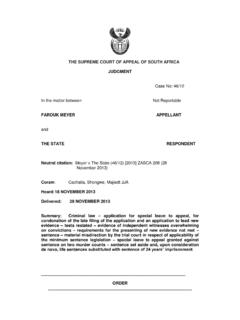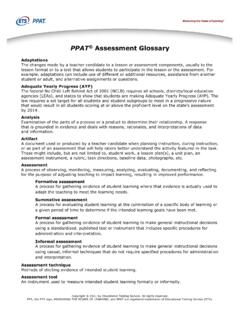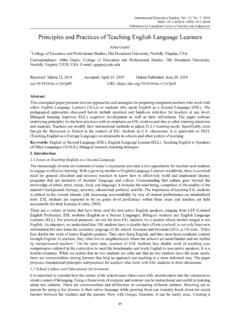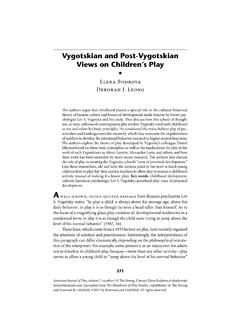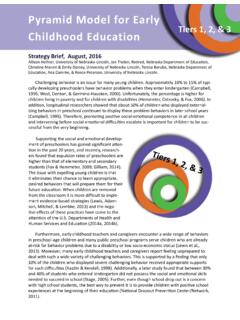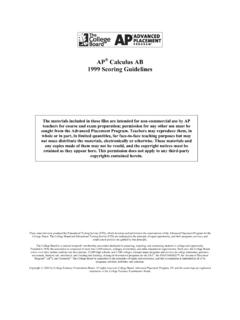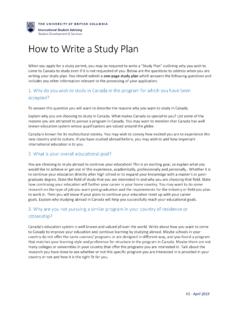Transcription of UNIVERSITY OF THE RULE BOOK 2022 FACULTY OF THE …
1 UNIVERSITY OF THE. FREE STATE. QWAQWA CAMPUS. RULE BOOK. 2022. FACULTY . OF THE HUMANITIES. UNDERGRADUATE AND POSTGRADUATE. Assistant Dean: Dr JR McDonald Office 30/31 Mendi Building Qwaqwa Campus Telephone: 058 7185436. E-mail: 1. Qwaqwa Rule Book 2022 FACULTY of the Humanities CONTENTS. ACADEMIC STAFF 3. CONTACT DETAILS 4. GENERAL UNIVERSITY RULES 5. General Academic Rules and Regulations 5. FACULTY Rules 5. General requirements to be admitted as a student to the FACULTY 5. Assessment of students 5. Examinations 6. Timetable Clashes 6. BACHELOR'S DEGREES 7. Minimum Admission Requirements 7. Explaining the terms subjects, modules, codes and credits 7. Explaining the terms majors, minors, core, fundamental and elective modules 7. Prerequisites 8. Duration of study and compiling a curriculum 9. Progression rules and readmission on the basis of academic progress 10. Changes to programmes and codes; students wishing to re-register under the new programme system 11.
2 UFSS1504 11. FACULTY Readmission Appeals Committee (FRAC) & the UNIVERSITY Readmission Review Tribunal (URRT) 11. Recognition of credits and exemption from modules 12. BACHELOR'S DEGREE PROGRAMMES 13. Bachelor of Arts 13. Bachelor of Arts (Extended Curriculum Programme) 19. Bachelor of Community Development 24. BACHELOR'S DEGREE PROGRAMME FOR SOCIAL SCIENCE 28. Bachelor of Social Science 28. Bachelor of Social Science (Extended Curriculum Programme) 33. POSTGRADUATE PROGRAMMES 38. African Languages Bachelor of Arts Honours with specialisation in African Languages 38. Master of Arts with specialisation in African Languages 39. English Bachelor of Arts Honours with specialisation in English 40. Master of Arts with specialisation in English 41. Doctor of Philosophy with specialisation in English 41. Geography Bachelor of Arts Honours with specialisation in Human Geography 43. Master of Arts with specialisation in Human Geography 43. Doctor of Philosophy with specialisation in Human Geography 44.
3 Sociology Bachelor of Arts Honours with specialisation in Sociology 45. Master of Arts with specialisation in Sociology 46. Doctor of Philosophy with specialisation in Sociology 46. 2. Qwaqwa Rule Book 2022 FACULTY of the Humanities ACADEMIC STAFF. * Indicates academic head of department Assistant Dean Dr JR McDonald Programme Director Dr G Magaiza Qwaqwa FACULTY Officer L Mohale Qwaqwa FACULTY Secretary U Jordan African Languages *Dr EN Malete, M Busane (Qwaqwa), Dr M Khanyetsi (Qwaqwa), BD Letlala, MF Makhele, MS Mensele (Qwaqwa), Dr AS Motsei, Dr H. Ndebele, SA Ndebele (Qwaqwa). Afrikaans and Dutch, German and French *Prof A van Niekerk, Dr A Barkhuizen (French), C Ellis, Dr M Human-Nel (Qwaqwa), Prof N Morgan (French), Prof H Pieterse , Dr M. Smit, Dr F Smith, A Stander, T Strauss (German), C Swart, Prof JPC van den Berg (German). Communication Science *Prof N Mboti, Dr D Breshears (Qwaqwa), Dr L de Lange, E Engelbrecht, ME Linstr m, E Lombard, Dr W Marais, Dr D Mulder, Dr M.
4 Ngcongo, L Radebe, Dr A van der Merwe English *Prof I Manase, Dr PO Aghoghovwia, Dr SI Brokensha, Dr M Brooks, Dr MS Conradie, Dr AR de Villiers, Dr N Dlamini (Qwaqwa), Dr CL. du Plessis, Dr CA Els, JG Henning, Dr R Makombe (Qwaqwa), N Motahane (Qwaqwa), N Ndou, Dr KM Ngara (Qwaqwa), Dr O Nyambi (Qwaqwa), Prof HJ Strauss History *Dr C Masakure, WJ de Wet (Qwaqwa), Dr JR McDonald (Qwaqwa), Dr T Moloi (Qwaqwa), Dr MM Oelofse, Dr LC Passemiers, Prof CM. Twala, Prof A Wessels Political Studies and Governance *Prof H Solomon, Dr A Botha, MP Choane, Dr E Coetzee, A Grobbelaar, MS Mthombeni (Qwaqwa), Dr B Naude (Qwaqwa), Prof TG. Neethling, PA Schoeman (Qwaqwa), *Dr T Coetzee, Dr CM Gouws (Programme in Governance and Political Transformation). Psychology *Dr ED du Plessis, K de Villiers (Qwaqwa), Prof KGF Esterhuyse, Prof JP Fouch , Dr J Jordaan, Dr A Khanye (Qwaqwa), Prof IP. Khumalo, Dr MJ Kometsi, I Kruger, Dr P Naidoo, Prof L Naud , Dr C Nel, Dr L Nel, ML Rossouw, Dr N Pule, Dr NF Tadi, H Taylor, Prof SP Walker Sociology *Prof SZ Matebesi, L Ackermann, Prof K de Wet, Dr WF Goodrick, Dr E Mayeza (Qwaqwa), KD Nena, Dr D Nzima (Qwaqwa), Dr M.
5 Phadi, NT Shange, NL Velelo 3. Qwaqwa Rule Book 2022 FACULTY of the Humanities Contact details FACULTY Officer: Qwaqwa Campus Ms L Mohale Tel: +27 (058) 7185405. Email: FACULTY Secretary: Qwaqwa Campus Mrs U Jordan Tel: +27 (0)58 7185438. E-mail: 4. Qwaqwa Rule Book 2022 FACULTY of the Humanities GENERAL UNIVERSITY RULES. 1. GENERAL INFORMATION. Note: It is important that students know the General Academic Rules and Regulations and the FACULTY rules that apply to their degree/diploma programmes. General Academic Rules and Regulations The General Academic Rules and Regulations that apply to all students and faculties are set out in the General Academic Rules and Regulations for 2022 (hereafter referred to as the General Rules). General rules deal with matters such as: Admission requirements for study at the UNIVERSITY ;. How to register for a programme. (These rules include details on how to change programmes, simultaneous registration, and whether credit will be given for work done at other higher education institutions.)
6 What is required to pass a module, or to be awarded a distinction (These rules include rules and details about tests, examinations and special examinations, rules about marks, rules that apply if a student misreads the examination timetable, and rules about readmitting students to or excluding students from programmes.). FACULTY rules FACULTY rules relate specifically to the degree and diploma programmes offered by the FACULTY of the Humanities. These rules are to be found in this book. General requirements to be admitted as a student to the FACULTY Generally, students may register for programmes offered by the FACULTY of the Humanities if they meet the UNIVERSITY 's admission requirements. Some programmes offered by the FACULTY of the Humanities require students to meet requirements in addition to those that the UNIVERSITY requires for general admission. Students must refer to the applicable programmes contained in this Rule Book to establish whether they qualify for a particular programme.
7 A prospective student registering for an undergraduate entry level qualification must take the Academic and Quantitative Literacy Test prior to registering. If the stipulated requirements of the National Benchmark Tests (NBT) (Academic Literacy 64%) have not been met, or the results of the tests cannot be submitted, registration for the applicable language development module (EALH1508) is mandatory. The credits of this module are additional to the credits required for the qualification. A qualification is not awarded unless the mandatory development module has been passed. Students who have successfully completed the HCert (Humanities) can, after applying for exemption with Universities South Africa (USAf), articulate to the first year of a mainstream Bachelor's degree in the FACULTY of the Humanities (selection criteria and -process for selection programmes still applies). Recognition of modules passed as part of the HCert, will be at the Dean and or Assistant Dean's discretion when a student articulates to a mainstream degree in the FACULTY .
8 Students who articulate to the first year of a mainstream Bachelor's degree, will also be required to complete the language foundation module, EALH2508, in their first year of registration of the mainstream degree. Students will not be allowed to start with any third year level modules of a mainstream degree if EALH2508 is not passed. Students who have completed the UNIVERSITY Access Programme (UAP) successfully and wish to continue their studies in the FACULTY , will be admitted to the second year of study of the Extended (4-year curriculum) Programme. Assessment of students Assessment is the process of determining the value, significance and extent of what students know, understand, and can do with their knowledge as a result of their educational experiences. Assessment results are used to document, explain, and improve performance. Assessment can be done at various times throughout a programme. A comprehensive assessment plan will include formative and summative assessment or, alternatively, continuous assessment.
9 The point at which the assessment occurs in a programme distinguishes these three types of assessment. Summative assessment is considered as assessment of learning and is distinguished from formative assessment, which is assessment for learning. Summative assessment 5. Qwaqwa Rule Book 2022 FACULTY of the Humanities Summative assessment takes place after the learning has been completed, , at the end of a quarter, semester or year and provides information and feedback that sums up the teaching and learning process. The intention behind summative assessment is to validate performance and award grades or marks. Formative assessment Formative assessment measures students' learning progress during the learning process to provide ongoing feedback and incremental feedback. It includes a range of formal and informal assessments, typically to monitor the progress being made towards achieving learning outcomes and obtaining a semester mark or predicate, admission to the summative assessment exam.
10 Continuous assessment Continuous assessment is used as an alternative to summative assessment. Continuous assessment is assessments that occur throughout the learning process and not only after the learning process. Students are thus examined continuously over the duration of a quarter, semester or year. It is cumulative and the marks are calculated to produce a final result. Students must read the study guide of each particular module carefully to determine exactly how they will be assessed in that module. Examinations Students registered for a module to which the promotion system is not applicable, and students with a module mark below 70% must write the examination for that module. To pass the module, a student must have a combined mark (that is, the module mark combined with the examination mark) of at least 50%, and the mark in the examination must be at least 40%. This mark is the Final Mark. Admission to the examination: A minimum semester/module mark of 40% is required to be eligible to write the final module examinations.
![2007 Natural and Agricultural Sciences] Part 2 ...](/cache/preview/1/5/6/8/8/a/b/9/thumb-15688ab9cc4402ef9b2339ad72a47048.jpg)
